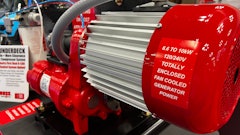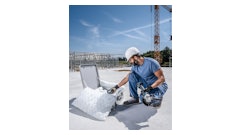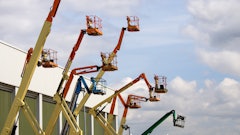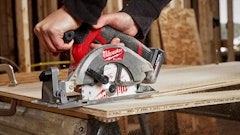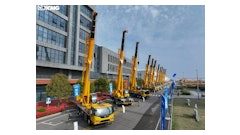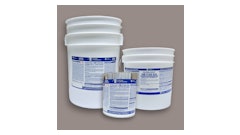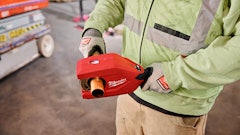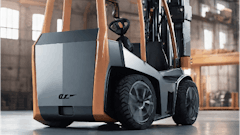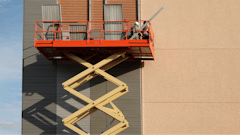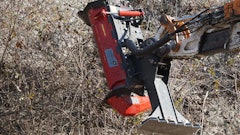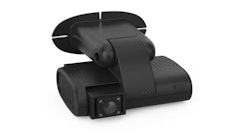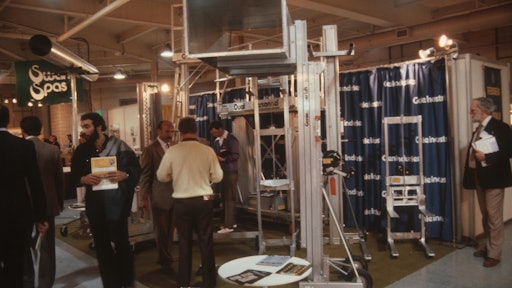
A lot can happen in 50 years. Just ask Genie, a supplement brand of Terex, who started 50 years ago as an idea by an electrician named Bud Bushnell in a small, local garage. Years of innovation, hard work, and customer-focused dedication has elevated the company to a global team that specializes in providing products and solutions for safely working at height.
In a white paper called, “Lessons Learned in 50 Years,” Genie speaks to their ever-present mission of solving access challenges, like developing the industry’s first articulated boom, and pushing innovation through taking risks and avenues like rental return on invested capital (rROIC).
Genie mentioned in the paper that their goal is designing products that provide good value, which is deeply rooted in, “having a deep understanding of how rental companies do business and the foundation of our approach to developing our next equipment innovations.”
But innovation just for innovation’s sake isn’t their intent, as they hope to solve business challenges in the process. The white paper continues, saying that Genie’s goal is to, “increase opportunity for rental revenue and decrease downtime, as well as overall cost of ownership to achieve a good rROIC.”
Rental Editor Alexis Brumm spoke with Matt Fearon, who at the time of the interview was Genie’s president, but has since decided to leave the company effective Aug. 1, to get an inside scoop on how the company’s mission of innovation benefits rental businesses and what the rental industry might expect in the next 50 years.
Rental: So, to start off, I read the “Lessons Learned in 50 Years” white paper, and the very first thing that was mentioned was the Genie hoists of the 1960s and how that really paved the way for the aerial lifting industry. I want to know what you think is the next great innovation that could change the industry today?
Matt Fearon: First of all, I'm glad you read that article; it made me reread it. If you look at the Genie hoist, it was just a really simple idea. It was done in a local garage here, but it marked the beginnings of Genie. If you look at the concepts that are there, there's the concept of innovation. There is the concept of continuous improvement. And there's a concept of listening to customers in order to decide what you develop. So, if you're talking about what is the next generation of innovation, I think it's going to come down to those same simple concepts.
What we do is, we make products and devices that make working at height safer and more productive. If you look at some of the trends that are out there, you know there's definitely an environmental focus that continues to grow. That's driving adoption, and it could be in the form of electrification, an E drive, and hybrid. You can see Genie is very active in that.
[But] I don't think there's going to be some big step, big change. What I think you're going to see is continuous improvement with these technologies, and you're going to see greater and greater adoption.
 Genie Lift ConnectGenie
Genie Lift ConnectGenie
R: That kind of plays into my second question then. The rental market is constantly changing, as is the rest of the world. How can innovation change the rental industry? You talked about the environmental focus, that continuous improvement. How does that directly tie into rental that you see?
MF: Well, I think the answer to that is it's going to come from looking at ways that we can work safer and more efficiently. Every company, every industry, they're doing business differently, and they're starting to adopt new technologies at a faster pace. They'll start to apply that to working safer at height. Some examples for technology and artificial intelligence, they're going to continue the quest towards perfect productivity, [but] there is no such thing.
You can see that if you look at the construction process and construction industry, and you measure it from a productivity standpoint, it has a long way to go and they know it. Everybody knows it. And if you look at just the number of materials that are idle, the number of machines that are idle, I think what you'll see is that they're using the technology to figure out how to make that move much more like a production process might be, and it will, especially as labor shortages continue to be an issue, you'll see that that productivity will have great payback.
The green movement, with the need for environmentally friendly solutions, is going to continue to grow. And you think a lot about emissions, but there's also noise. If you listen to the diesel engines, the noise that they put out, and if you have an aerial lift operating, a generator operating, an excavator operating, and you take the readings on the noise, there’s a lot. Especially if you're going in any kind of enclosed building. And I think that what you'll see is people will realize, hey, the technology's right there. There's a lot of reasons to go for it.
So, lots of opportunities and I, again, come back to it's going to be incremental improvements because the technologies are there, and they're being used successfully already.
R: In the white paper, you mention that you design products to provide a good rental return on invested capital (rROIC) for customers. In my research and reading more about it, I think that's a really critical consideration when it comes to rental businesses, and I think it's something that a lot of people may not think about or consider. What kind of things are you doing to achieve this? What makes Genie stand out in this regard?  Genie SX-180Genie
Genie SX-180Genie
MF: This goes back to the simple concepts. It all comes down to listening to the customers. It’s all about understanding how rental companies operate their business, how they maximize their returns, what role do we play in maximizing the time utilization, or how to minimize the downtime warranty data? What are we doing with the warranty data? What are we doing with the telematics input that we're getting from the machines? When we're collecting data, we're getting rich data on how to help the rental companies make more money.
That's the trick for us, and one of the big things that we focus on is getting the engineering and product management teams to really dig in and understand that. It always ends up coming back to the customers. They'll tell us what's good and what's bad, and they're not shy about it, they're willing to share with us, so it's a rich source of getting the information you need to really stand out. That rental rROIC is one that you'll hear all different parts of our organization talk about, so taking the time to talk with the customers and understand what they're doing, and then translating that into value, is the role that we play.
Some recent examples, first, we took the lead on these higher capacity XC booms in the industry, and we did it with data. We went out, looked at jobsites, and we could see that they were putting more than 500 lbs., which was standard capacity on most booms, and we wanted to verify it, so we used our telematics. We look and sure enough, these things are being used on a daily basis with more than the 500 lbs. So, we looked at the standard change that was coming and we said, “Hey, when that comes out, we have to weigh the load anyways, let's use those inputs to drive productivity across the rental fleets.” So we knew the jobsites needed more capacity, and we provided.
The other one is our FE technology, or our hybrid. We know it's a machine that enables lower total cost of ownership. The thing about the FE product is, we were looking down the road, eight, nine years from now, to when they need to dispose of that machine. It's a great hybrid machine, has all the capability of running it on straight DC or flip the engine on, but when you go to get rid of that, it has a 24 hp rest-of-world engine. That's a big deal to a rental company. So, we're looking at the entire value of that machine from the day they buy it, how much time utilization do they get out of it, how much maintenance does it take during the life of the machine, and how much money can they get for it when they go to sell it. It's an important recipe for success in our opinion.
R: So, from what you're seeing and the research you've done to understand the rental companies, where do you see the industry in the next five years? What is the next big challenge that you think Genie is going to try and solve?
MF: Well, I think the rental industry, like all industries, is going to be moving rapidly to technology adoption, and it will be driven by anything that will improve safety, anything that will improve productivity on the jobsites. That's what they'll latch onto. Our job as a manufacturer is to demonstrate to the rental companies how to apply these new technologies, so that they can see that productivity and it translates into the, going back to the rental rROIC, profitability for them, or clear safety advantages on the jobsite.
So for us, we've got to take those technologies and translate how it impacts their business. Because we believe that the technologies are there, we're putting a lot of technologies in these machines, and to be honest, I don't think people are tapping into all the technology that we have available today, so that's back on us. But I think it's exciting because the appetite is changing for the use of technology, and I think that you're going to continue to see this next generation just expect more. They're going to expect speed. They're going to expect to be able to find out information quickly and act on it quickly. It puts a lot of pressure on the OEMs, but it's good! It's good for us; it will help us do our part to drive the productivity in the industry.
R: Just a quick side question to that: You mentioned that you think people aren't totally tapping into the technologies that are out there. Do you think that's a generational thing? Older business owners, older operators? Do you think people are just unaware of it? Do you think they're scared of it? What do you think the main reason behind that is?
MF: No, I don't think they're scared of it, and I don't see a barrier based on age. What I see is there's just so much. There’s so much information, it doesn't matter where you go, and it's really hit all of us quickly, so being able to sort it out so that you have information that is actionable is really what we're trying to distill it down to.
So, I think it's just a matter of there's so much data and everybody's trying to figure it out like, “Okay, what can I really act on? What can I actually use?” And then once you get that figured out, you'll take it to the next step. And then to the next step. So, I see that happening right now. And especially the availability of data from the cloud, and the cost of storing data and accessing data has dropped dramatically in the last three years, so in that three years, everybody’s like, “Oh, I got a lot of data. Now, what I do?” I see that more of the barrier than age now.
 Genie team members making face coveringsGenie
Genie team members making face coveringsGenie
MF: I think, all of us, the entire society, is trying to figure out what this means right now. What I will say is that the dialogue we're having with our customers is as deep and rich as I've ever seen in my 25 years. When I talked to them about, “How's it impacting your business? What are you doing?” We’ll go on for 45 minutes about, what are you doing, what are you doing, how do you see it, what's going up, what's going down? So, I think there's an openness to how this is playing out and people are still getting their heads around it.
You know, if you look at the rental industry, the thing that I would say that should be encouraging is they truly are supporting essential services. At the core of what rental companies do is they provide equipment that’s needed to support healthcare, it's needed to support infrastructure, construction, whether they're making face masks, thermometers, oil, or whatever. Industrial, they need the type of equipment that rental companies have. Power; they're big into power. And it's all the things that we need to support.
The global economy is suffering right now. As we go forward, all economies are going to be looking for, what do we have to do to spark the economy back? It's going to be infrastructure. I see it as, yeah, we've taken a big reset as an industry, but it's going to come back, and we are right in the middle of what it's going to take to bring us back. I think I would put that in the encouraging side.
What I see them doing is being very pragmatic about what industries are going to grow. Some examples of that would be warehousing. We're all shopping online, and you’ve never seen so many delivery trucks. You need warehouses to store all this stuff because no one's walking in stores anymore. That’s an opportunity. I talked about the proliferation of access to data. Data centers, they consume a lot of equipment, and they'll have a focus on that. And I mentioned infrastructure. Those are kind of the bright spots. I don't think anybody is banking on entertainment businesses being a big part, [like] sporting events, big concerts, and things like that. I think everybody realizes, “Hey, for at least the next 18 months, that's not going to be a big source of revenue,” so they're taking a very pragmatic approach to what is going to come up as we come out of this virus. And there will be things that drive the economy, and that will drive rental, and that will drive machines coming back.
They need to help figure out how to respect the social distancing, and they're figuring that out. They're figuring out how to do curbside deliveries, how to do nighttime service, how to do online ordering. I don't think you're going to see as many people walk in to rent a piece of equipment; it's all going to be done remotely and that's good. Technology’s there. It's going to be more efficient. So, I think you'll see the industry adapt. Always have, always will.
The other thing that I would say would be on the positive side is, if you go back to 2009 when we had the global economic crisis, what happened was large construction companies that decided they wanted to own equipment got to, “Wow, maybe I should just rent this,” because you get caught in an economic slump like this, and all of a sudden, you have a piece of equipment that isn't fully utilized. Rentals the answer to that. So, it's not all bad news. It's not going to snap back right away, but the rental industry is creative and they'll adapt.
You can find Genie’s white paper, “Lessons Learned in 50 Years” at https://www.genielift.com/en/aerialpros/lessons-learned-50-years.







